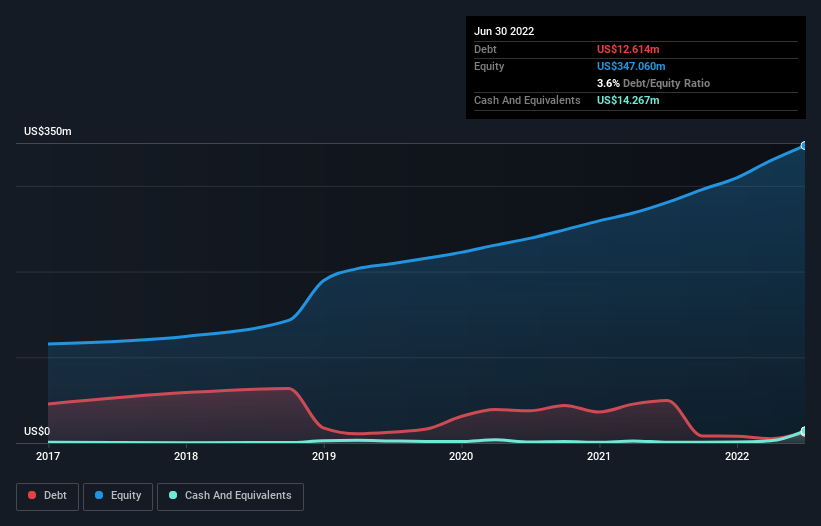
David Iben put it well when he said, 'Volatility is not a risk we care about. What we care about is avoiding the permanent loss of capital.' When we think about how risky a company is, we always like to look at its use of debt, since debt overload can lead to ruin. We note that Legacy Housing Corporation (NASDAQ:LEGH) does have debt on its balance sheet. But the real question is whether this debt is making the company risky.
When Is Debt Dangerous?
Generally speaking, debt only becomes a real problem when a company can't easily pay it off, either by raising capital or with its own cash flow. If things get really bad, the lenders can take control of the business. However, a more frequent (but still costly) occurrence is where a company must issue shares at bargain-basement prices, permanently diluting shareholders, just to shore up its balance sheet. Of course, debt can be an important tool in businesses, particularly capital heavy businesses. When we examine debt levels, we first consider both cash and debt levels, together.
Check out the opportunities and risks within the US Consumer Durables industry.
How Much Debt Does Legacy Housing Carry?
The image below, which you can click on for greater detail, shows that Legacy Housing had debt of US$12.6m at the end of June 2022, a reduction from US$49.7m over a year. However, its balance sheet shows it holds US$14.3m in cash, so it actually has US$1.65m net cash.

How Healthy Is Legacy Housing's Balance Sheet?
According to the last reported balance sheet, Legacy Housing had liabilities of US$42.9m due within 12 months, and liabilities of US$23.1m due beyond 12 months. Offsetting these obligations, it had cash of US$14.3m as well as receivables valued at US$48.9m due within 12 months. So it has liabilities totalling US$2.76m more than its cash and near-term receivables, combined.
Having regard to Legacy Housing's size, it seems that its liquid assets are well balanced with its total liabilities. So it's very unlikely that the US$404.7m company is short on cash, but still worth keeping an eye on the balance sheet. While it does have liabilities worth noting, Legacy Housing also has more cash than debt, so we're pretty confident it can manage its debt safely.
In addition to that, we're happy to report that Legacy Housing has boosted its EBIT by 36%, thus reducing the spectre of future debt repayments. When analysing debt levels, the balance sheet is the obvious place to start. But it is future earnings, more than anything, that will determine Legacy Housing's ability to maintain a healthy balance sheet going forward. So if you want to see what the professionals think, you might find this free report on analyst profit forecasts to be interesting.
Finally, a company can only pay off debt with cold hard cash, not accounting profits. Legacy Housing may have net cash on the balance sheet, but it is still interesting to look at how well the business converts its earnings before interest and tax (EBIT) to free cash flow, because that will influence both its need for, and its capacity to manage debt. In the last three years, Legacy Housing's free cash flow amounted to 21% of its EBIT, less than we'd expect. That's not great, when it comes to paying down debt.
Summing Up
We could understand if investors are concerned about Legacy Housing's liabilities, but we can be reassured by the fact it has has net cash of US$1.65m. And it impressed us with its EBIT growth of 36% over the last year. So we don't think Legacy Housing's use of debt is risky. There's no doubt that we learn most about debt from the balance sheet. However, not all investment risk resides within the balance sheet - far from it. We've identified 1 warning sign with Legacy Housing , and understanding them should be part of your investment process.
At the end of the day, it's often better to focus on companies that are free from net debt. You can access our special list of such companies (all with a track record of profit growth). It's free.
New: AI Stock Screener & Alerts
Our new AI Stock Screener scans the market every day to uncover opportunities.
• Dividend Powerhouses (3%+ Yield)
• Undervalued Small Caps with Insider Buying
• High growth Tech and AI Companies
Or build your own from over 50 metrics.
Have feedback on this article? Concerned about the content? Get in touch with us directly. Alternatively, email editorial-team (at) simplywallst.com.
This article by Simply Wall St is general in nature. We provide commentary based on historical data and analyst forecasts only using an unbiased methodology and our articles are not intended to be financial advice. It does not constitute a recommendation to buy or sell any stock, and does not take account of your objectives, or your financial situation. We aim to bring you long-term focused analysis driven by fundamental data. Note that our analysis may not factor in the latest price-sensitive company announcements or qualitative material. Simply Wall St has no position in any stocks mentioned.
About NasdaqGS:LEGH
Legacy Housing
Engages in the building, sale, and financing of manufactured homes and tiny houses primarily in the southern United States.
Flawless balance sheet and undervalued.
Similar Companies
Market Insights
Community Narratives




